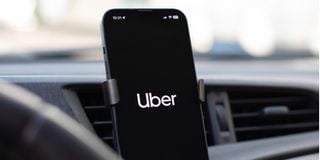Uber raises ride charges after pressure from drivers

In an announcement on Monday, Uber said the price increases would be across all of its products.
What you need to know:
- However, the company remained tight-lipped about how the pricing of its various ride products would be affected.
Ride-hailing company Uber has raised its ride charges, including minimum fares, bowing to pressure from its drivers, who have been protesting its prices for months and even resorted to setting their own rates in recent weeks.
In an announcement on Monday, the company said the price increases would be across all of its products, revealing a 10 per cent adjustment to minimum fares. However, the company remained tight-lipped about how the pricing of its various ride products would be affected.
“Effective today, we’ve finished our calculations. We first had to analyse the prices, look at the data, and speak to drivers with whom we have round tables almost every week. We’ve finished our analysis and now we have increased our prices on all our products,” said Imran Manji, Uber’s Head of East Africa.
While the company was tight-lipped about how prices would change for different products, it indicated that the lowest fare a passenger can pay – the minimum fare for the Uber Chap Chap product – would increase by 10 percent.
“If you are only going down the road we will give you the minimum to make sure that the driver is compensated for the shortest journeys. That minimum fare for Chap Chap is now Sh220; this was Sh200,” Mr Manji said.
Uber says its pricing mechanism (algorithm) takes into account factors such as the minimum fare, the starting fare, the fare per kilometre which is based on the distance travelled, and the fare per minute which takes into account the time taken to complete a journey.
Uber's fare adjustment comes in the wake of complaints from passengers that drivers were charging more than the price that flashed up on their app, generated by the company's algorithms. Drivers have resorted to producing their own fare guide, which they print, laminate and post in their cars for customers to see.
Mr Manji said the drivers' protests were "an input, but not the decisive factor".
“Even before the protests, we increased the price of Uber Comfort about eight weeks ago because the demand was good and the number of vehicles on the product needed to go up. It’s an input, but not the most decisive input, there are multiple other conditions,” he said.
After months of driver protests against the ride-hailing companies' pricing mechanisms, several other companies had adjusted prices, but Uber remained adamant.
“We hope that this behaviour of price negotiation will now stop. We encourage all passengers that if they find themselves subject to that to please report it to us directly or in the app. We ask all passengers to please report any behaviour where a driver is asking for an amount more than what is in the app,” Mr Manji said on Monday.
“Overall, where we think we’ve settled is a good balance between an increase for the drivers while still being affordable for passengers,” he added.
The company has been caught in the dilemma of dealing with restive drivers who feel its fees are minimal compared to its costs, and a price-sensitive Kenyan market where any slight increase in price results in a drop in customers.
With about eight different products in the country and more than 20,000 drivers on its app, Uber says it has had to invest heavily in weekly promotions, where a passenger pays less than the average fare for a trip, to encourage more trips.
Uber also says it has recently seen an increase in customer complaints about drivers asking for more money from rides, although it did not disclose the figures.
“We are not able to provide that figure. But we have channels through the app where you can complain about a specific trip, then we can start investigations and take action. We have been seeing reports coming in and we are taking action,” said Ms Lorene Onduru, Uber’s head of communications in Kenya.




